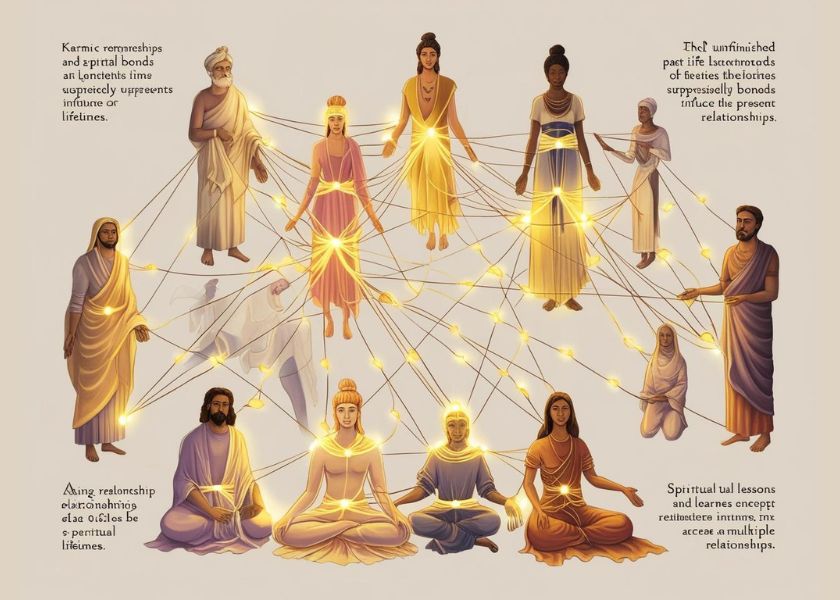Understanding Past-Life Connections in Relationships
Life often presents us with relationships that feel unusually intense, challenging, or inexplicably magnetic. Whether it is the unending cycle of conflict between a mother-in-law and daughter-in-law, the boss-employee power struggle, or the emotional entanglements in romantic partnerships, these relationships may stem from unresolved karmic debts from past lives. These bonds, woven by actions and emotions from previous incarnations, are carried forward into this life for resolution, learning, and growth. Let us explore the profound concept of karmic bondage and how it manifests in our relationships.
What Is Karmic Bondage?
Karmic bondage refers to the unseen ties between individuals, formed due to unfinished deeds, unresolved karma, or unbalanced exchanges in past lives. These relationships reappear in our current life to help us settle the “balance sheet” of karma, teaching us essential life lessons along the way. They can manifest as intense attraction, inexplicable resentment, or a recurring cycle of pain and joy.
Vedic texts says, “Karmic Bondage” implies a more restrictive and negative cycle where past actions create attachments that trap someone in a cycle of sufferings which hinders the spiritual progress of individuals.
How Karmic Relationships Manifest in Different Areas of Life
Here are some common examples of karmic bondage, where past-life connections shape present-day relationships:
“Shri Krishna says, Karma refers to the actions we take, whether good or bad. These actions create consequences that affect our future. Reincarnation means the belief that when we die, our soul is reborn into a new body, and this cycle continues through many lifetimes.”
1. Saas-Bahu (Mother-in-law and Daughter-in-law) Conflicts
This relationship often feels like a battlefield. Past-life dynamics of control, jealousy, or neglect may carry over, creating tension and misunderstandings. Perhaps, in a past life, one oppressed the other, and the roles are now reversed to balance the scales of karma.
2. Sibling Rivalry
When siblings engage in persistent competition or resentment, it may stem from past lives where one overshadowed or betrayed the other. These relationships challenge both individuals to rise above jealousy and learn cooperation and mutual respect.
3. Parent-Child Struggles
A parent and child relationship that feels burdensome or disconnected could indicate karmic debts. For example, a child may feel neglected because the parent, in a past life, was dependent on them. These bonds encourage forgiveness, nurturing, and emotional healing.
4. Romantic Relationships
Toxic or obsessive romantic connections often carry karmic baggage. A partner’s unfaithfulness, emotional imbalance, or over-attachment could mirror unresolved issues of trust, love, or betrayal from a previous life. These relationships offer lessons in self-worth, balance, and unconditional love.
5. Boss-Employee Dynamics
Power struggles in the workplace, where a boss undermines an employee or vice versa, may reflect past-life roles of domination or exploitation. These dynamics push both parties to resolve issues of authority and respect.
6. Financial Relationships (Lender-Borrower)
A lender who feels exploited or a borrower who feels trapped may be replaying roles from a past life where financial responsibilities were neglected or abused. This relationship demands accountability and balance in material exchanges.
7. Malik-Naukar (Master-Servant) Dynamics
Unbalanced relationships, where one person consistently dominates or exploits the other, could stem from unresolved servitude or mistreatment in previous lifetimes. Healing comes from mutual respect and acknowledgment of each other’s humanity.
8. Toxic Friendships (Dost-Dushman)
Friendships with underlying tension or betrayal often indicate karmic patterns. A friend’s jealousy or manipulation might mirror unresolved envy or competition from a past life, pushing both to rise above petty emotions.
9. Caregiver-Cared-for Relationships
A caregiver who feels trapped or burdened by their role may have unresolved karmic ties with the person they care for. In a past life, the roles may have been reversed, and the relationship now demands patience, understanding, and healing.
10. Parental Alienation
Divorced parents who alienate a child from the other parent often carry unresolved karmic baggage of betrayal or manipulation. These situations urge individuals to prioritize forgiveness and compassion over personal grievances.
11. Unresolved Teacher-Student Bonds
The intense admiration or resentment between a teacher and student may indicate past-life connections. Perhaps the teacher failed to guide the student properly in a previous incarnation, and the relationship is a second chance to fulfill that duty.
Signs You Are in a Karmic Cycle
Karmic relationships often share these characteristics:
- Intense and immediate connection or repulsion.
- Recurring patterns of conflict or harmony.
- Feeling “trapped” in the relationship.
- Strong emotions, whether love, hate, or dependency.
- Life lessons that push you towards growth.
- A sense of déjà vu, as if you’ve known the person or relationship before.
- A magnetic pull towards the person, even if the relationship is unhealthy.
- Feeling emotionally, mentally, or even physically drained after interactions.
- A pattern of making the same mistakes despite wanting change.
- A sense of unfinished business or an inability to walk away, no matter how hard you try.
- The presence of synchronicities or unusual coincidences
How to Heal Karmic Relationships
Recognizing and healing karmic bonds is essential to break free from toxic cycles and achieve spiritual growth. Here are some ways to heal these relationships:
Healing karmic bondage or karmic relationships is only possible through the divine grace of Devi Mahakali, Mahalakshmi, and Mahasaraswati, as described in the Atharva Veda. Mahakali severs the ties of past karmas, Mahalakshmi restores harmony and abundance in relationships, and Mahasaraswati grants wisdom to transcend karmic cycles.
Without their intervention, one remains trapped in repetitive karmic patterns. The Shree Yantra is the ultimate remedy to attract positivity in all relationships, dissolve unwanted karmic debts, and align one’s life with divine energies. It acts as a conduit for Devi’s blessings, ensures freedom from karmic entanglements and the manifestation of pure, harmonious connections.
सैषा सत्त्वरजस्तमांसि।सैषा ब्रह्मविष्णुरुद्ररूपिणी। सैषा प्रजापतीन्द्रमनवः।सैषा ग्रहनक्षत्रज्योतींषि। कलाकाष्ठादिकालरूपिणी।तामहं प्रणौमि नित्यम्॥ पापापहारिणीं देवींभुक्तिमुक्तिप्रदायिनीम्। सायमधीयानो दिवसकृतं पापं नाशयति। प्रातरधीयानो रात्रिकृतं पापं नाशयति। सायं प्रातः प्रयुञ्जानो अपापो भवति।
Each Avarana (Layers) of the Shree Yantra can help you purify different layers of karmic influences, brings transformation at the physical, emotional, and spiritual levels. The worship of each Avarana of the Shree Yantra is designed to systematically remove karmic blockages, enhance divine vibrations, and establish harmony in all aspects of life, which can ultimately lead you to liberation from unwanted karmic cycles.
Conclusion: Breaking Free from the Cycle
Karmic relationships are not punishments but opportunities for growth and transformation. They challenge us to confront unresolved emotions, correct past mistakes, and evolve as individuals. By recognizing the signs of karmic bondage and embracing the lessons they bring, you can break free from the never-ending cycle of toxicity and move towards healthier, more fulfilling relationships. Remember, the key lies in awareness, forgiveness, and conscious effort to balance the karmic scales.
Content by: Editorial


